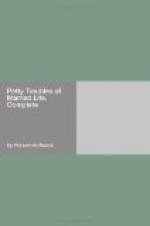M. Deschars points out an opportunity for Adolphe to seize. A house is to be sold at Ville d’Avray, for a song, of course. Now, the country house is a weakness peculiar to the inhabitant of Paris. This weakness, or disease, has its course and its cure. Adolphe is a husband, but not a doctor. He buys the house and takes possession with Caroline, who has become once more his Caroline, his Carola, his fawn, his treasure, his girly girl.
The following alarming symptoms now succeed each other with frightful rapidity: a cup of milk, baptized, costs five sous; when it is anhydrous, as the chemists say, ten sous. Meat costs more at Sevres than at Paris, if you carefully examine the qualities. Fruit cannot be had at any price. A fine pear costs more in the country than in the (anhydrous!) garden that blooms in Chevet’s window.
Before being able to raise fruit for oneself, from a Swiss meadow measuring two square yards, surrounded by a few green trees which look as if they were borrowed from the scenic illusions of a theatre, the most rural authorities, being consulted on the point, declare that you must spend a great deal of money, and—wait five years! Vegetables dash out of the husbandman’s garden to reappear at the city market. Madame Deschars, who possesses a gate-keeper that is at the same time a gardener, confesses that the vegetables raised on her land, beneath her glass frames, by dint of compost and top-soil, cost her twice as much as those she used to buy at Paris, of a woman who had rent and taxes to pay, and whose husband was an elector. Despite the efforts and pledges of the gate-keeper-gardener, early peas and things at Paris are a month in advance of those in the country.
From eight in the evening to eleven our couple don’t know what to do, on account of the insipidity of the neighbors, their small ideas, and the questions of self-love which arise out of the merest trifles.
Monsieur Deschars remarks, with that profound knowledge of figures which distinguishes the ex-notary, that the cost of going to Paris and back, added to the interest of the cost of his villa, to the taxes, wages of the gate-keeper and his wife, are equal to a rent of three thousand francs a year. He does not see how he, an ex-notary, allowed himself to be so caught! For he has often drawn up leases of chateaux with parks and out-houses, for three thousand a year.
It is agreed by everybody in the parlor of Madame Deschars, that a country house, so far from being a pleasure, is an unmitigated nuisance.
“I don’t see how they sell a cabbage for one sou at market, which has to be watered every day from its birth to the time you eat it,” says Caroline.
“The way to get along in the country,” replies a little retired grocer, “is to stay there, to live there, to become country-folks, and then everything changes.”
On going home, Caroline says to her poor Adolphe, “What an idea that was of yours, to buy a country house! The best way to do about the country is to go there on visits to other people.”




